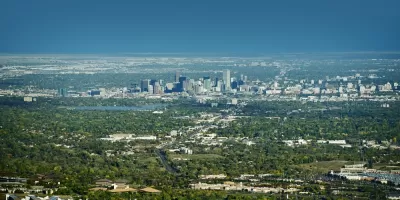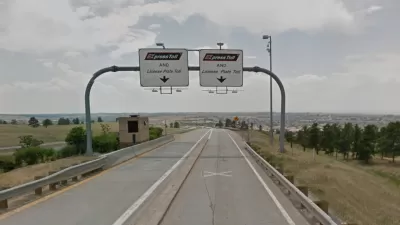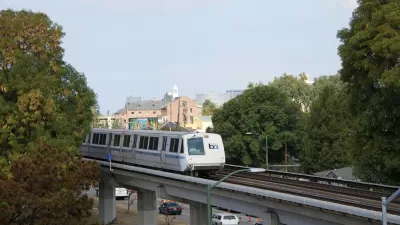Partisan politics killed what was labeled as a bipartisan effort to increase funding for Colorado's roads by allowing voters in November to determine whether to raise the state sales tax to fund a bond measure.

House Bill 1242 may have had the backing of the state's Republican leadership, but that didn't stop Senate Republicans, who control that branch of the General Assembly, from killing the measure in committee.
Despite reducing the size of the sales tax hike from .62 percent to .50 percent, three Republican members of a Senate panel effectively killed the measure, "citing ideological opposition to increasing taxes," reports John Frank for The Denver Post.
The controversial bill had cleared the Democrat-controlled House of Representatives on March 31. "Four Republicans bucked party lines to vote for the measure...The other 24 Republicans voted no, saying lawmakers needed to cut spending on things like Medicaid in order to pay for transportation needs within the state’s existing budget," reported Brian Eason for The Post.
That's the central theme of the transportation lobbying group, Fix Colorado Roads. The first step, they argue, is to establish "a permanent source of general fund dollars for roads" rather than dedicate a new taxing option.
Why a sales tax and not a gas tax?
Colorado's gas tax, 22 cents per gallon was last increased in 1991. In February, it was rated 39th highest in the nation, i.e., only 11 states had a lower tax.
As posted in March, Colorado is the only state to have enacted a TABOR, short for Taxpayer Bill of Rights, which requires legislation that raises taxes be subject to a statewide plebiscite. Polling showed that a sales tax fared better than a gas tax.
The funding plan
"The primary road projects on the list are an expansion of Interstate 25 north and south of Denver and Interstate 70 west through the mountains," reports Frank. "But millions more would have flowed to local governments to repair crumbling local roads and expand transit options."
The emphasis on roadway expansion is also one of the tenets of Fix Colorado Road: "Build large scale roadway expansion programs statewide."
Now what?
"Now that the bill is dead, attention turns to two possible alternatives: a separate far-reaching spending bill aimed at eliminating budget cuts to hospitals that could serve as a vehicle for transportation spending and a handful of potential ballot initiatives," adds Frank.
They don't have much time—the session adjourns on May 10.
Hat tip: AASHTO Daily Transportation Update
Related in Planetizen:
Transportation Sales Tax Advances in Colorado Legislature, March 24, 2017:A bill to ask voters in November to increase the state sales tax by 0.62 percent to fund transportation projects passed its first House committee March 22 on a partisan vote, with Democrats in support and Republican opposed.
FULL STORY: Transportation tax hike proposal reaches end of the road in Colorado

Alabama: Trump Terminates Settlements for Black Communities Harmed By Raw Sewage
Trump deemed the landmark civil rights agreement “illegal DEI and environmental justice policy.”

Study: Maui’s Plan to Convert Vacation Rentals to Long-Term Housing Could Cause Nearly $1 Billion Economic Loss
The plan would reduce visitor accommodation by 25% resulting in 1,900 jobs lost.

Why Should We Subsidize Public Transportation?
Many public transit agencies face financial stress due to rising costs, declining fare revenue, and declining subsidies. Transit advocates must provide a strong business case for increasing public transit funding.

Paris Bike Boom Leads to Steep Drop in Air Pollution
The French city’s air quality has improved dramatically in the past 20 years, coinciding with a growth in cycling.

Why Housing Costs More to Build in California Than in Texas
Hard costs like labor and materials combined with ‘soft’ costs such as permitting make building in the San Francisco Bay Area almost three times as costly as in Texas cities.

San Diego County Sees a Rise in Urban Coyotes
San Diego County experiences a rise in urban coyotes, as sightings become prevalent throughout its urban neighbourhoods and surrounding areas.
Urban Design for Planners 1: Software Tools
This six-course series explores essential urban design concepts using open source software and equips planners with the tools they need to participate fully in the urban design process.
Planning for Universal Design
Learn the tools for implementing Universal Design in planning regulations.
Smith Gee Studio
Alamo Area Metropolitan Planning Organization
City of Santa Clarita
Institute for Housing and Urban Development Studies (IHS)
City of Grandview
Harvard GSD Executive Education
Toledo-Lucas County Plan Commissions
Salt Lake City
NYU Wagner Graduate School of Public Service




























